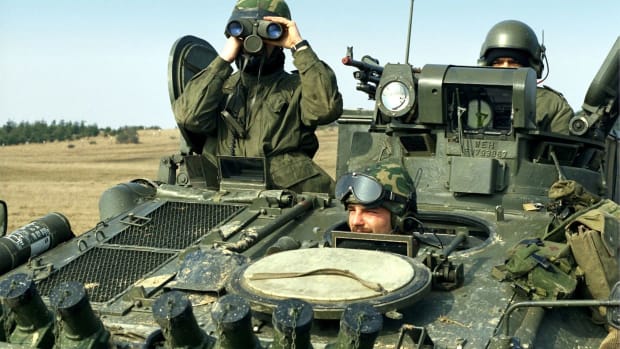
Is a European army a good idea or not?
A European army: is it a good idea or not? An increasing number of Dutch people seem to be in favour of it. Not entirely surprising, given the major military unrest in the world. Folia discussed the issue with Samuël Kruizinga, lecturer in contemporary and military history at the UvA.
There has been a lot of talk recently about a European army. Why do you think that is?
“The Trump administration has been sending out all kinds of signals that Europe is becoming less important and that the US is no longer automatically prepared to provide military support under any conditions. The way Trump is handling the war in Ukraine, for example by lying about who the aggressor is, is also not in the interest of European security. This raises the question of to what extent we can still count on the Americans in the future.”
Are the European concerns about this justified?
“Yes, let me be very clear about that. I think there are good reasons for concern when it comes to the geopolitical challenges in Europe. Russia does not adhere to international law, so even if there is a possible truce in Ukraine, there is no guarantee that they will adhere to it in the long term. These are challenges that Europe must counter with something, and a military component is probably part of that.”

Is the creation of a European army a realistic scenario?
“There is a lot of talk about a European army, but it is very unclear what exactly is meant by this. If it is mainly about further cooperation, that idea is not new. The Dutch armed forces already operate primarily within the NATO alliance, in peacekeeping forces under the UN flag or in multinational coalitions. The Dutch armed forces are certainly not just there to guard their own borders, even now. For example, our navy patrols not only Dutch waters, but also Belgian waters. There are all kinds of close collaborations of this kind between different armed forces of other NATO countries.”
So in practice there is already a kind of European army?
“In any case, there is a great deal of cooperation. If you look at what the Dutch armed forces have done in recent decades, it has always been in a larger context, with the EU or the UN. So when we are talking about that European army, I don’t think anyone seriously means that we should disband the Dutch armed forces tomorrow. The discussion is about practical matters and intensifying cooperation. How do we ensure, for example, that command is organised in such a way that it is able to respond quickly?”
“The interesting thing is that historically speaking, there was an earlier initiative to create a European armed force, just after the Second World War. This was to secure German industry and the large number of inhabitants of Germany under a European flag, without the possibility of a large German army ever again being able to rise up. That discussion went much further back then than what is realistically on the horizon now, but the idea is not new. Nevertheless, I think that a real European army is still no more than an interesting yet distant idea.”
What would be the main advantages of a European army?
“That mainly comes down to economies of scale and specialisation. In the Netherlands, for example, we currently have an army, an air force and a navy. These all duplicate the capabilities of other countries, so there is room for improvement in terms of efficiency. If one large European army were to speak with one voice, it would be able to handle things like procurement and weapons systems more efficiently. By working together more intensively in the long term, Europe would also become less dependent on America.”
Are there any disadvantages?
“You are dealing with difficult political discussions. Who exactly should such a European armed force listen to? And what happens if all countries want to deploy the armed force, except Hungary? Politically speaking, it is extremely difficult to sell the idea of an armed force doing anything other than defending its own country.”
“In addition, you have to deal with practical challenges. Take an example from the past: the army of Austria-Hungary. All kinds of different languages were spoken there, and of course it takes time and effort to coordinate them properly. Differences can also arise in the area of culture within such an international army. But that too can be resolved. It helps that poor English is already more or less the lingua franca of Europe at the moment.”
A frequently heard argument against a European army is that too much sovereignty would be transferred. What is your view on this?
“When people talk about sovereignty, they are often referring to something that is seen as indivisible. As if there is a single package of sovereignty from which something disappears when powers are transferred to Europe. I find that a 19th-century way of thinking. If you look at how integrated Europe is, that simply requires coordination. I believe that sharing sovereignty can actually strengthen it.”

